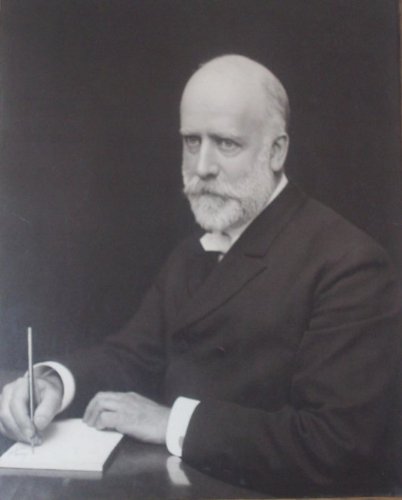Theme: We are called to follow Jesus, the way; thus to become a way for others.
Scripture Reading: Acts 6:1-7; Ps. 32:1-2, 4-5, 18-19; 1 Pet. 2:4-9; Jn. 14: 1-12
Rueben Archer Torrey was a great preacher and evangelist in United States of America. He was born in 1856. His father was lawyer and banker. His father became bankrupt when Torrey was a teenage boy. He was smart in learning. He was an expert dancer. Torrey joined the university but immediately got into vices. His mother was devout Christian. She always prayed for son to turn from the sinful ways. One day, Torrey left house after fighting with his mother. She was just asking him to turn from his evil and godless ways.
 After leaving home, Torrey plunged into sin. One night, he felt the impulse to commit suicide. He looked for possible weapon to kill himself. He loaded revolver and laid to his head. At the same time, he remembered his mother who always prayed for him. It is also said that at the same time, his mother also was prompted to pray for him at the same hour. The very next moment, Torrey fell on his knees and prayed and surrendered himself to Jesus. He changed his ways. He decided to dedicate his life to preach Christ. He studied scriptures. He organised Bible conferences in different parts of the world. He toured China, Japan and Korea. Torrey himself was lost the way. He met Christ, the way; his life was changed. His life became the way for others. He saved many souls from their sinfulness. Although he was belonging to denominational churches, his life gives a great lesson.
After leaving home, Torrey plunged into sin. One night, he felt the impulse to commit suicide. He looked for possible weapon to kill himself. He loaded revolver and laid to his head. At the same time, he remembered his mother who always prayed for him. It is also said that at the same time, his mother also was prompted to pray for him at the same hour. The very next moment, Torrey fell on his knees and prayed and surrendered himself to Jesus. He changed his ways. He decided to dedicate his life to preach Christ. He studied scriptures. He organised Bible conferences in different parts of the world. He toured China, Japan and Korea. Torrey himself was lost the way. He met Christ, the way; his life was changed. His life became the way for others. He saved many souls from their sinfulness. Although he was belonging to denominational churches, his life gives a great lesson.
We find in the Gospel today, Jesus declares his disciples that he had to depart from this world and return to his father. He would prepare a place for them. The dominant word in this conversation is the ‘place’ or ‘Father’s house’. The easy reading of the text will tell us that it is heaven. Is it the only thing that Jesus intended to tell his disciples? There is  much more than what we think. Jesus was inviting them to look at his relationship with his father. St. John the Evangelist tells in his Gospel that Jesus had very close relationship with God. He says in the prologue of the Gospel, “No one has ever seen God. It is God the only Son who is close to the Father’s heart who has made him known.” (Jn. 1:18) So the location is not the place but the relationship. If we want to know where Jesus came from or where he is going, we need to know his relationship with God. In other words, God’s house is about relationship. It is not about the location.
much more than what we think. Jesus was inviting them to look at his relationship with his father. St. John the Evangelist tells in his Gospel that Jesus had very close relationship with God. He says in the prologue of the Gospel, “No one has ever seen God. It is God the only Son who is close to the Father’s heart who has made him known.” (Jn. 1:18) So the location is not the place but the relationship. If we want to know where Jesus came from or where he is going, we need to know his relationship with God. In other words, God’s house is about relationship. It is not about the location.
It is in this context; Jesus tells us that he would return to take us with him. thus, we will be with him forever. Jesus confirms with the disciples that they know the way. But one of them says that they do not know where was he going (the place) and so they do not know the way. Jesus tells them “I am the way, the truth and the life. No one can come to the father except through me.” Jesus calls himself the way. It is interesting to note that the expression of ‘the Way’ has great influence on the Christianity right from the early days. The early Christians were called ‘the way’. St. Paul introduced himself as a follower of ‘the way’ to the governor (Acts 24:14). There are so many instances where Christians were called the way in the act of the apostles (Acts 9:2; 19:9; 19:23; 24:14; 24:22).
 What does it mean to be called the way? The Hebrew wisdom tradition gives us deep insights in this matter. The way denotes the life style of wise in accordance with the sages (Prov. 2: 8, 20). A psalmist uses the expression as a metaphor to describe a life lived according to law or the will of God (Ps. 119: 1,3). The expression of the way in the Hebrew scriptures is not used as the location but the faithful’s personal relationship with God.
What does it mean to be called the way? The Hebrew wisdom tradition gives us deep insights in this matter. The way denotes the life style of wise in accordance with the sages (Prov. 2: 8, 20). A psalmist uses the expression as a metaphor to describe a life lived according to law or the will of God (Ps. 119: 1,3). The expression of the way in the Hebrew scriptures is not used as the location but the faithful’s personal relationship with God.
Jesus called himself the way. In other words, he was asking them to follow him, follow his teachings. He was asking them to get into relationship with him. He taught his disciples many things but he gave them the greatest lesson at the last supper. He had washed their feet. He had shared his body and blood with them. He had called them to do the same.
Today’s first and second readings gives witness how the early Christians lived the teaching of Christ. They personally related with God. The poor widows from the Hellestics were overlooked by the Hebrews. Therefore, they appointed seven men from their own community to look after the temporal affairs. And they devoted their time in preaching the word of God. St. Peter exhorted his faithful to live like dignified followers of Christ. he calls them a chosen race, a royal priesthood, a consecrated nation and a people set apart to sing the praise of God. All these titles of the Old Testament are used to the followers of Christ. In the midst of persecution, St. Peter is exhorting his people that they have found Christ, the way, the truth and the life.
 It was obvious that the expression of the way was given to the early Christians who followed the teaching of Christ. The exegetical notes on the words ‘the place’ (dwelling place) and the expression of ‘the way’ are also pointing to the fact of personal relationship with God. Jesus was calling his disciples to enter into personal relationship with the God. Once we enter into his relationship – we will find the way, the truth and the life.
It was obvious that the expression of the way was given to the early Christians who followed the teaching of Christ. The exegetical notes on the words ‘the place’ (dwelling place) and the expression of ‘the way’ are also pointing to the fact of personal relationship with God. Jesus was calling his disciples to enter into personal relationship with the God. Once we enter into his relationship – we will find the way, the truth and the life.
Torrey lived a wayward life. He met Christ; his life was changed. He found Christ who wanted to relate with him. once he got into the relationship, his life became the example for others. He was an expert dancer. He says when he was converted, he took two hours to talk to a girl with whom he danced. At last, he was successful because that girl accepted Christ in her life. Torrey became the way to many. We too are called to follow Christ, the way. Are we ready to follow him?
Fr. Alex D’Mello






